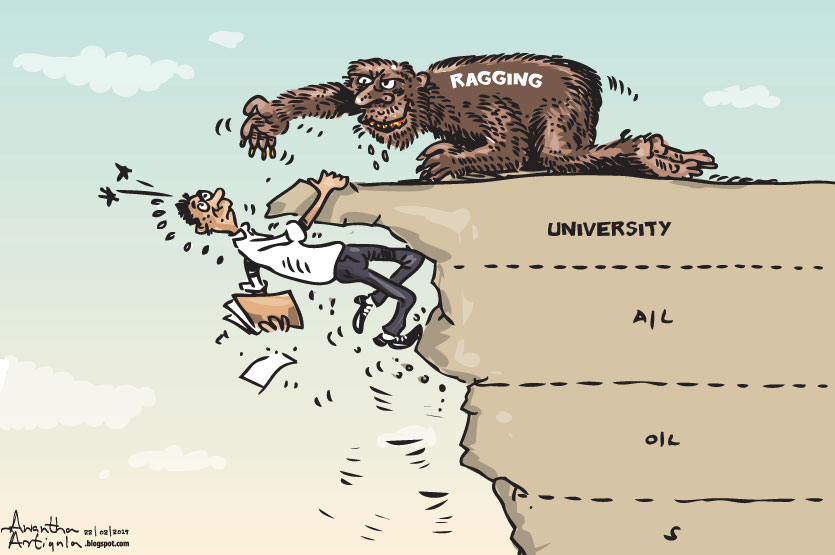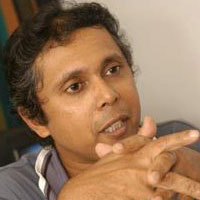Mar 01 2017.
views 4619Ragging and free education: A distorted correlation
Higher education is a golden opportunity which is not appreciated by many of those students who are ‘lucky’ enough to walk in to a university. ‘Protests’ and ‘ragging’ have become the two immediate words anybody could use to define the state education system in Sri Lanka today. The once highly respected free education system founded by the late C.W.W Kannangara has opened doors to criminals within the system. As such ragging has once again spread its wings to a sickening state challenging what has been written on the books. According to the ‘Prohibition of Ragging and other forms of violence in educational institutions Act, No. 20 of 1998,’ ragging is officially prohibited in universities and is a punishable offence under the Ragging Act. In an attempt to find the root causes of this sudden outburst of sickening ragging incidents, Life Online spoke to a few individuals of varied expertise.

Incidents of ragging in Sri Lanka
Over the years Sri Lanka has stood out as a country that has failed to administer discipline in its education system. This was quite evident in the context in which ragging has evolved from just asking juniors to sing a song to death. Following are some of the major incidents which have remained to haunt the memories of Lankans:
· In 1974, ragging of several trainee mathematics teachers at the then Vidyalankara University (now University of Kelaniya) prompted Prime Minister Sirimavo Bandaranaike's Government to appoint V. W. Kularatne Commission to probe the incident. This is the first major step taken against university ragging by a Sri Lankan government.
· In 1975, University of Peradeniya reported the first ragging related death when a 22-year-old female student of the Faculty of Agriculture, Rupa Rathnaseeli became paralyzed as a result of jumping from the second floor of the hostel - to escape the physical ragging carried out by her seniors. She later committed suicide in 2002.
· Prasanga Niroshana, a student from Hakmana, died as a result of ragging he underwent at School of Agriculture, Angunakolapallassa.
· In 1997, 21-year-old S. Varapragash, an Engineering student of University of Peradeniya, died from a kidney failure following severe ragging by senior students.
· In 1997, Kelum Thushara Wijetunge, a first-year student at the Hardy Technical institute in Ampara, died from a kidney failure after he was forced to do tough exercises and drink excessive quantities of liquor.
· In 2002, Samantha Vithanage, a third year Management student at the University of Sri Jayewardenepura, who pioneered an anti-ragging campaign, was killed at a meeting, while in a discussion on ragging.
· In 2006, Prof. Chandima Wijebandara, the Vice Chancellor of University of Sri Jayewardenepura resigned from his post as a result of students failing to comply with his orders to eliminate ragging from the university.
· In 2014, D.K. Nishantha’s body was found hanging from a tree within the premises of the University of Peradeniya. The ragging was so intense that both victims had to be admitted to hospital.
· This year 15 second year students from the University of Peradeniya were arrested for taking a group of juniors to a house in Megodakalugamuwa for ragging purposes.
If the perpetrators are found they would be punished: Lakshman Kiriella

Speaking to Life Online, Minister of Higher Education and Highways Lakshman Kiriella said that none of these students who have been ragged have made any complaints so far. “We have setup centres for them to come up and make complaints if they experience any sort of ragging but they are reluctant to do that. I’m quite happy that the Police was able to take prompt action with regard to the incident which took place in Peradeniya. When looking at the situation at hand these students who rag others or who do all sorts of notorious things are a part of a microscopic minority in the country. There are students who are 31 years who still haven’t got their degree. By the age of 31 they should be married and having children but here they are, wasting time and resources, resitting exams and turning in to a frustrated group. Most of these groups are financed by political parties who have hidden agendas. In fact if we come across the perpetrators they would definitely be punished. Therefore we are gradually monitoring and controlling this situation and we hope to mitigate it to a larger extent very soon.”
The Sri Lankan education system doesn’t empower students: Dr. Nirmal Ranjith Dewasiri

Former Federation of University Teachers’ Association (FUTA) President Dr. Nirmal Ranjith Dewasiri said that there are many unethical things that are happening. “The worst part is that these students are tolerating it when they get ragged. Those who are subjected to ragging are those who can prevent it from happening again. But why do they tolerate it? If they are not tolerating and are also not giving in to the seniors’ pressure then this issue would have been controlled to a larger extent. The problem arises with the fact that these newcomers also enter the university premises with much fear and lost hopes giving a chance for the seniors to rag them. Therefore even without an external power they behave as if they have been ragged. In this context we could see that the Sri Lankan education system doesn’t empower the personalities of its students but weakens them even further.”
We are a lower-middle class country and our people are never happy: Prof. Siri Hettige

In his comments Senior Professor of Sociology at the University of Colombo and sociologist Siri Hettige said that Sri Lanka has a lot of experience with regard to ragging. “Ragging has been in existence since the 1980s which was the time of civil unrest. During unrest whether it’s among the youth, adults or children is of less importance since they all are looking at ways to let out their inner pressure. During the 1990s death by suicide became a common occurrence and a Presidential Task Force was established to control deaths caused by suicide. We had to look at why the suicide rate was on the rise and search for various responses. Today we could see major issues that prevail in the education system itself. There’s so much of anxiety and dissatisfaction among the people with regard to the SAITM controversy. We are a lower-middle class country and we are stuck there. We don’t have a larger representation of the middle class and the upper class is even minute. It is often seen that people at the lower middle class level are never happy. The quality of education has declined and except for ‘privileged’ schools every other school is under a lot of pressure. The lower middle class cannot afford to send their children to international schools and therefore the dropout rate is extremely high for men.”
Speaking further Prof. Hettige said that a majority of students are females but most developing countries look at sending men and women equally to all industries. “The youth has become more hopeless because although they have free education the quality is incredibly poor. 70% of children in rural areas do not have access to English syllabuses and therefore they fail to face interviews in the corporate world. During the days when I was involved in the administrative work at the University of Colombo we introduced a multi-dimensional approach to this ragging issue. In fact we conducted programmes under different topics to keep the students engaged in them, thereby transforming the university atmosphere. Students were involved in planning various projects, skill development and even got the alumni to teach the children from what they know and have experienced. Through this approach we succeeded in stepping out of ragging but this is easier said than done. Children who were under pressure always had the freedom to walk up to a counsellor and talk about their grievances.” In his concluding remarks Prof. Hettige said that the university education system has evolved in to a catastrophic situation and it is not what it used to be. Back in the day when we said we were going to the university we were so much thrilled. Those in power have kept postponing this issue to the future and here we are dealing with it after all these years. There is no money available to improve the quality of education and this keeps moving towards the precipice.”
It’s in the hands of the lecturers to discipline the students: Senior Academic and Lecturer
A senior academic and a lecturer of a local university who wished to remain anonymous said that ragging is an utterly disgusting thing to see. “In fact we do not need the Police coming in to control this issue. Lecturers themselves could have solved the problem but I do not see why it is not practical. The duty of a lecturer is not only teach the subject matter and leave the university premises but they should also try to discipline the children. Back in the day ragging involved getting the newcomers to sing or kneel down or other lighter ways of ‘entertaining’ themselves but today it has reached an entirely new level that I wouldn’t even have imagined. In fact if I came across a student who was involved with an incident similar to what happened recently at the University of Peradeniya, I would have refrained from setting an exam paper. So the student will not be able to pass his or her exam if the paper is that of a compulsory subject. Also whatever the privileges they get if they produce a high score too could be removed. At least lecturers should get them down and give them a stern warning highlighting the repercussions of getting involved in the ragging scene. One thing is very clear that these students who are supposed to be the ‘best brains of the country’ haven’t had a good upbringing from the home front.”
Online help centre
At the onset of this sudden outburst of ragging the University Grants Commission (UGC) setup and Online Complaint Mechanism which would make it easier for victims to lodge complaints. A statement released by the UGC stated that any member of the University Community could lodge a complaint regarding incidents of ragging, harassment, intimidation and bullying by accessing the link from the UGC web site www.ugc.ac.Ik/rag and confidentially. It said all complaints lodged would be investigated and victims of such incidents would be offered support and redress. It said affected students could also reach out to the UGC hotline 0112-123700, 0112-123456 by following the instructions provided through the Interactive Voice Response System.
7 Comments
Pinto says:
Mar 01, 2017 at 06:32 pmSome people say that so far students who got ragged never complained and authorities cannot take any action. This is a lame excuse given to turn a blind eye when everybody knows the the law has been broken. For an example, if a group of people are found stabbing people on the street with knives, and if nobody makes a complaint police won't take any action even if the law is broken. One does not need tonnes of brains to understand that the students who are subjected to ragging are reluctant to do so through fear of reprisals by so called seniors. You cannot rely on present or past university leadership to prevent ragging because they themselves have gone through this mill and, most of them condone this activity. Victims of ragging must be allowed to make complaints and their identities must be protected. Phone text messages directly to the police can be used to lodge complaints. Surveillance cameras must be installed in and outside of all university premises. Those who do not complete their courses in stipulated time must be forced to complete their courses as external students. Freshers must be given self confidence to stand up for themselves and say "No" to ragging. The leadership training that was given by previous government is a good step in the right direction but I presume it was stopped due to political reasons. There should be fitting punishment for the crime. We have heard numerous occasions where students got paralyzed, committed suicide, injured and left the campus without completing courses due to ragging but, we hardly hear any of the culprits serving a jail term. Lack of fitting punishment encourages the wrongdoer to commit the crime. If the current laws are not sufficient to protect the students from this lowly act, then laws must be amended to protect the citizen.
Ruwan says:
Mar 03, 2017 at 03:13 amVenting all the anger and blame towards university students is the typical response for this problem. Ragging is not a uniquely Sri Lankan problem, this can be seen in almost most all south Asian countries as ragging, and in western world it is what they called bullying. However in western universities do not experience such ragging due to many reasons unique to their culture and thinking. Addressing this despicable act has to be done with a broader scope. Prof Hettige sheds some light into this by addressing the frustration of lower income families. It is difficult to expect ragging to stop even if we get out of this economic trap. What are the chances of getting out of this economic trap? Following the education system that was left behind by British we get university students at the age of 18. This system worked for British and western world, but can it be applied universally? Like democracy, white mans shoes do not fit us. High time we understand this and try to resolve this. It's only a dream because the so called educated crowed want to copy their masters.
Sylvia Haik says:
Mar 03, 2017 at 09:25 pmThis is a totally defeatist attitude when you have resigned to the attitude that democracy is the purview of the white man that we cannot accept. Ragging too is what we have emulated from Western Schools and Universities but unfortunately, we have corrupted it as usual. Surprisingly "Ragging" is welcomed by the respective community as it is a totally fundraising event with all proceeds going to local charities. You would find MP's and local business tycoons, letting themselves be kidnapped for ransom. The Sri Lankan form of ragging that is so damaging could be stopped with a little forethought. Just like the victims of abuse as children in schools in U.K. were given the right to sue their school as adults, victims of ragging should be able to sue the raggers and the universities for allowing it to go on.
Sherez says:
Mar 03, 2017 at 12:47 pmPls STOP the ragging completely. This a mental pressure on Students as well as for our parents. I was selected to a Uni,but because of all these ragging stories I quit. Deep down I still cry that I couldn't fulfill my & my parents wish because of the bladdy raggers. The Uni deen,the education minister the president of this country should take action and STOP this completely. If President Mahinda was able to stop a brutal war ,Why cant President Mithripala do a change and have his name written in the history books of SL as the ONLY president in SL as well as in the world to "STOP Ragging completely. " If these people have a proper back-bone they should do !!!!
Siva Sivachelvam ( preferred name by my Nick nam says:
Mar 05, 2017 at 09:54 pmThere is good enough information above to deal with. We also need to be concerned with the two victims we see by the system. The person who is ragging and the new student who is being ragged. The both students came through the same education system. Actual ragging attitude developed quietly during the school time (between GCE OL and AL) . We simply ignored them as teenage problems. The policy makers have to very carefully analyse the mental state of 8 to 18 and their joy of living. It is common that significant proportion of students are attending private tuition after shool time even longer than the school time resulting physical and mental stress on the students. Recently the Ministry of Education recruited 2600 councillors to deal with students who have the stress-related mental illness. The students who somehow passed and entered the University to their second year and further are showing their anger and mental stress they had earlier during the school time to the new arrivals. We all the citizens of Sri Lanka have to look closer at the bringing up of 8 to 18 to make sure they are brought up with kindness, love, care for fellow human beings and give them an opportunity having spare time to enjoy the joy of living. We have to bring up the students, 8 to 18 to have a healthy mind and a caring attitude towards other human beings. This is a specific social issue to improve the mental attitudes of the 8 to 18 students to become good citizens of Sri Lanka. Once we have achieved the healthy mind of students from very young then dragging and the similar behaviour will disappear not only from the universities but also from all the levels of the society.
Rohan says:
Mar 06, 2017 at 06:31 pmMy own younger brother was fortunate to have been educated in Cuba on a scholarship awarded by that country. He did Medicine at the University of Havana and when he went there all the senior students were very happy to welcome him and other fresher students who had come from various other countries with different religious, linguistic, cultural and social backgrounds. They never ragged even a single student and ragging is unheard of in the universities of that country. While my brother was in Cuba a particular ragging incident happened in a Sri Lankan university had been reported in a newspaper there and the batch mates of my brother were shocked to hear that such a nasty incident had happened in a country like Sri Lanka, a friendly country of Cuba. They had inquired of my brother who the culprits behind that incident were because one Cuban student, who had visited Sri Lanka previously on a cultural exchange programme, had told them that such indecent, inhumane and cruel activities in Sri Lankan universities are instigated with the concurrence of a student body encompassing all the universities and also with the blessing of a political party with leftist leanings. So my brother was compelled to reveal who those raggers were and which that particular political party was. The aforesaid student had already found that the said political party had initially in late 1960s been nicknamed after one of the greatest Cuban revolutionaries called Che Guevara. Most of those Cuban students were horrified to hear that the so called socialist political party in Sri Lanka, which originally got inspiration from one of their great revolutionaries, could instigate such despicable and evil activities against their own brethren most of whom belonging to the poor families in Sri Lanka. Those Cuban students had condemned that political party in unison and cursed it. So what I can say here is that unless the obvious relationship between the said political party and their cohort student body called “anthare” is severed, ragging will continue in Sri Lankan universities forever. Deterrent punishment should be meted out to those devilish and maniac raggers who suffer from sheer jealousy and a virulent form of inferiority complex. Through ragging and other intimidating tactics they try to increase the membership of the said bankrupt political party that has a grip on them.
john the senior says:
Mar 08, 2017 at 06:56 pmThere are few issues that provide breeding ground for raging in state universities. 1) In the present day, it is a very well organized activity, where all the seniors, rather those are pro-rag plan the process of ragging about three months in advance - before the new students arrive. This is so structured hierarchical process where spying on officials (marshals, security - any one who has the authority to implement anti-rag act) so closely and carefully, such that it is not easy to catch the seniors in the act... the whole business is to get the junior students to follow orders, not to question the plans of the student unions, and to seriously harass those who oppose.. more like a military training - to follow orders without questioning - complete opposite of the role of a university. 2) There is a political dimension too into the manifestation of raging where certain groups or parties find cheap labor for protest and anti-government publicity, regardless who is in power - green or blue etc 3) There is a social dimension where, those from less privileged background use ragging, when they are senior students, to get even with social injustice - victims are the new comers with some affluent status and background 4) the role of the university top administrations, in many state universities, has been to somehow keep the top chair, be in the position, for the duration or 3-year term, where some VCs/DVCs/deans etc go to the length of accommodating any nasty behavior of unions to protect the position .. this should explain why, apart from individual cases of attempts to stop ragging, there has been no real progress, though an anti-rag act is there with severe punishments